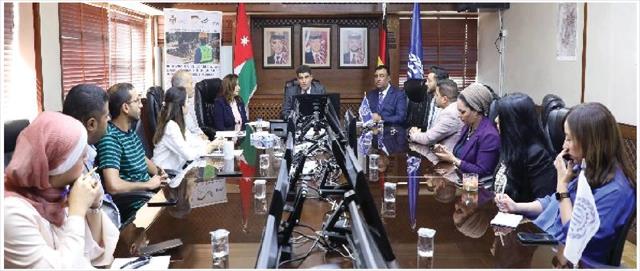(MENAFN- Jordan Times) AMMAN - The International Labour Organization (ILO) on Wednesday signed a new implementation agreement with the Ministry of Local Administration to support community infrastructure projects in 15 municipalities.
The agreement falls under the sixth phase of the Employment Intensive investment Programme (EIIP) in Jordan, funded by Germany's federal Ministry for Economic Cooperation and Development (BMZ) through the German Development bank (KfW), according to an ILO statement.
The project is being implemented in partnership with the Ministry of Agriculture, Ministry of Local Administration, the Ministry of Labour, municipalities and private sector.
The agreement, worth around JD4.96 million (approximately $7 million) aims to facilitate the implementation of "Employment Intensive Investment Projects in the selected municipalities for decent employment involving Jordanians and Syrians to enhance short-term Income and Improving Livelihoods."
The joint effort aims to create short-term employment for 1,250 individuals' jobs opportunities under this component that creates 110,000 paid person days decent employment for 50 per cent Jordanians and 50 per cent Syrians including 30 per cent women and 5 per cent people with disability through construction, rehabilitation and maintenance of municipal community infrastructure using employment intensive investment programme approach.
These projects are in line with the developmental plans of each municipality. The Ministry of Local Administration will support the ILO in the competitive selection of beneficiary municipalities, capacity building and supervision based on pre-defined criteria, ensuring utmost professionalism and transparency, including a technical, financial and community consultations evaluation criteria, the statement said.
Following the selection process, implementation agreements will be signed with the selected municipalities in the governorates of Amman, Balqa, Ajloun, Jerash, Irbid, Mafraq and Zarqa.
The 18 million euros funding for phase VI is provided by the German government for the implementation of the current phase of the EIIP over 24 months. The programme aims to increase short-term income and improve living conditions for workers from disadvantaged communities through decent paid employment. It also provides young Jordanians and Syrians with skills that will help them secure mid- and longer-term job opportunities.
Secretary General of Ministry of Local Administration Hussein Muhaidat said:“This agreement will help local municipalities capacity to implement local community infrastructure projects that will benefit the communities and contribute to the employment of Jordanians and Syrians and improve their economic situation through paid employment”.
Senior Portfolio Coordinator Assia Al Dhabbi, who attended the signing ceremony, said:“The German government and KfW are committed to supporting economic opportunities and employment creation in Jordan through sustainable projects to create economic benefit and contribute to national plans. In addition to that, these projects contribute to the social cohesion and support the creation of green inclusive jobs.”
ILO Chief Technical Adviser Shailendra Jha Kumar said:“ILO is always committed to implement projects that will create decent working conditions and happy to be part of the implementation of local community infrastructure projects that will support the local communities and will contribute to supporting the government of Jordan in facing the pressure on the services due to the Syrian crisis that still affecting the region and creating short-term paid jobs and long-term effect on the local communities”.
The EIIP project began in 2016 in Jordan in response to the Syrian refugee crisis and to help the government of Jordan face challenges relating to the Syrian influx. It focuses on increasing short-term employment through improving infrastructure and environment and providing youth with skills that will support them to find longer-term job opportunities.
The project is inclusive for Jordanian, Syrians, men, women and persons with disabilities.

























Comments
No comment